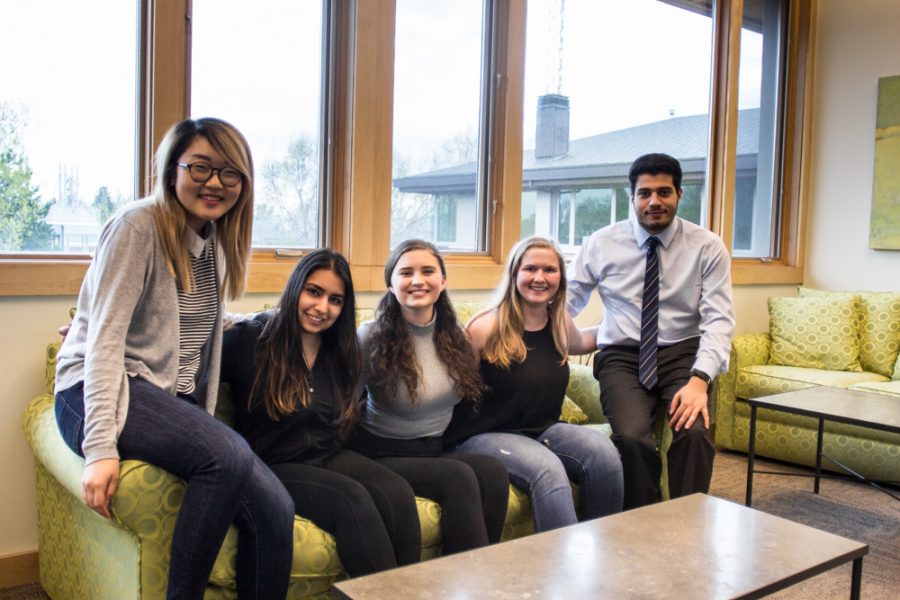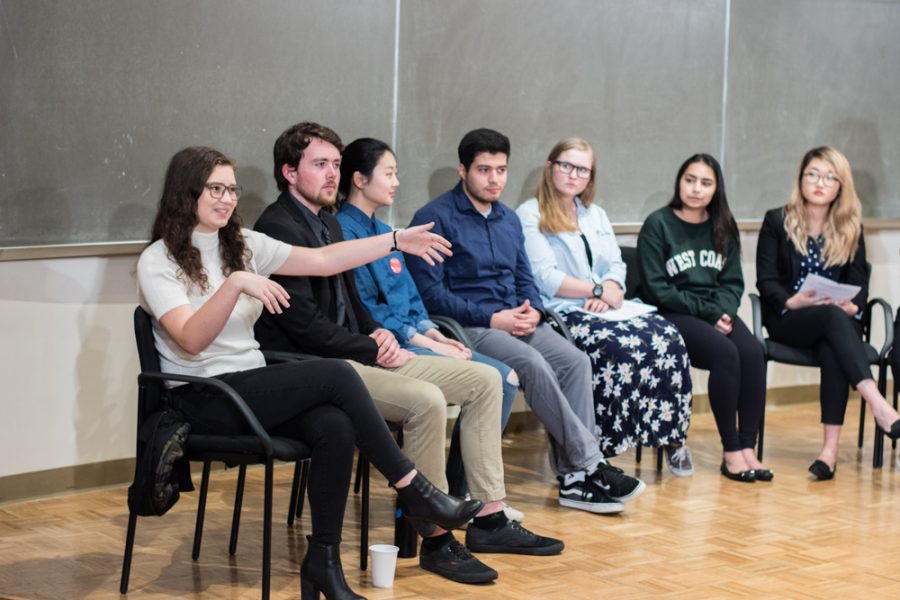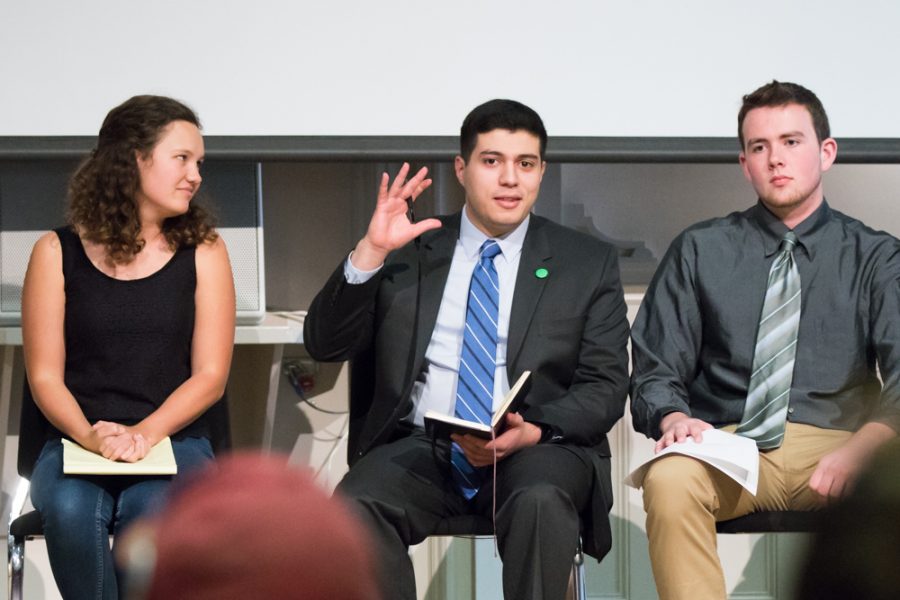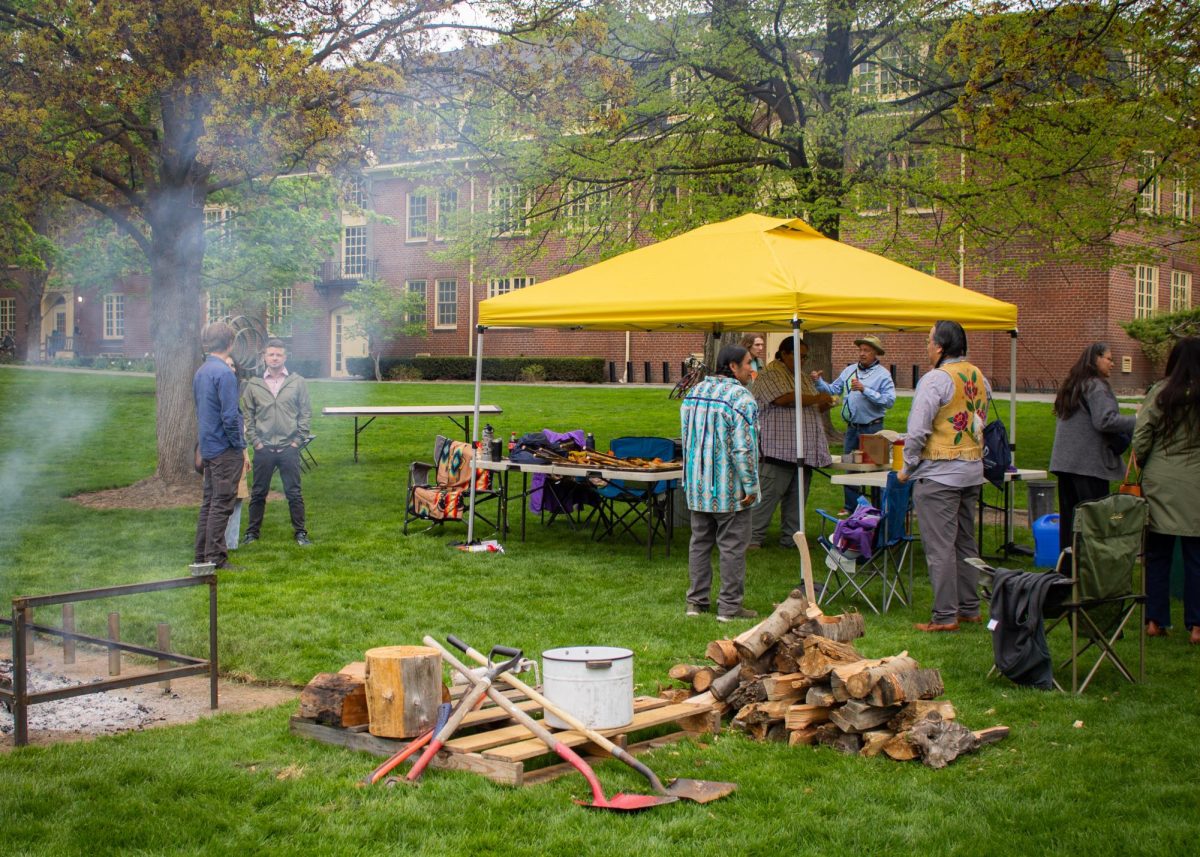ASWC’s Executive Council elections take place Monday, April 11. The Pioneer asked president, vice president, finance chair and nominations chair candidates to answer questions about their views and what they would do if elected.
President and Vice President
Candidates: Matt Dittrich (President) and Maggie Appleton, Zach Duffy, Jack MacNichol and Geni Venable (Vice President)

Pioneer: What do you think is the biggest issue facing Whitman students right now and how would you work to fix it?
Dittrich: Our greatest issue is one of individual agency. We are the reason Whitman exists. We should be able to change Whitman for the better. Next year, I will work to increase student representation on college committees and governing boards, operationalize the student green fund and other student development funds, and increase campus communications — in terms of number of forms and frequency. There is a tremendous difference between a town hall, set at a specific time and place, and a fireside chat with President Bridges broadcasted via Youtube. We need more of the latter.

Appleton: The gaping divide between what we learn in the classroom and what we’re going to have to deal with the day after graduation. If you’re at Whitman you undoubtedly value education for its own sake; that has its place in life but you’ve got to strike a compromise with reality at some point. The majority of us will not be earning a living off publishing in academic journals and should prepare ourselves accordingly. I’m looking to instate practical education opportunities across the board to balance out our penchant for academia. This means more support for experiential internships — especially internationally — and a substantial increase in applied knowledge courses such as the O’Donnell lecture series.
Duffy: Whitman students are feeling crunched — by limited class selection, by over-enrolled courses, and by an over-reliance on inexperienced visiting professors, to name just a few problems, and it can often feel as if the administration isn’t listening to student concerns. That’s why, as ASWC VP, I want to survey every Whitman student on what they want out of their college experience in order to articulate a formal, comprehensive vision for Whitman’s future from the student perspective. The project will make Whitman more accountable to the student body in future decisions like 3-2 while spurring the development of new programs.
MacNichol: I think that the 3-2 switch, and the resulting course compression, is a very serious issue that truly affects all Whitman students. Now that the switch is complete, ASWC needs to continue its work with the faculty and administration to help address the specific issues the switch is causing for students. I think two specific issues that needs ASWC’s continued attention are ensuring that course compression is not making it difficult or impossible for students to complete majors, minors, or distribution requirements and also ensuring that enough entry level classes are available to allow students to explore different academic fields.
Venable: In my time at Whitman, 3-2 has provoked the most unified and clear response from the student body and for that reason alone, I would consider it the biggest issue facing our student body. I would push for new tenure track professor lines, courses offered in wider time slots, and continued firsthand student input to the administration. It is also important not to let the enormity of this issue detract from other concerns and potential projects of the student body — ASWC has many representatives and can offer the student body more than advocacy on this one issue.
Pioneer: What do you think ASWC’s role should be on the faculty’s curriculum committee and in addressing 3-2 and course compression?
Dittrich: For reasons stated above, student representation on the curriculum committee is a no-brainer. Students are the reason we have a curriculum. Students can help positively shape curriculum. And it’s our duty to do so. Nearly all of our peer institutions employ students’ services on these committees — I see no reason why the model wouldn’t work for Whitman. Student representation on the curriculum committee gives us a remedy to the squeeze of enrollment pressure and course compression; it gives us agency to positively change our college, this place we love.
Appleton: Having a voice in the curriculum and the aftereffects of 3-2 is perhaps the most important issue for ASWC to step up to in the coming year. Our role should center around bringing student perspectives to the table and having them considered on the same level as faculty or administration input. It will always be a struggle to have the higher-ups deal with student issues in a manner than doesn’t inevitably fall back on our ephemeral nature as four-year members of this community. Overcoming this will require constructing an ASWC leadership culture that hands down issues and allows us to create a continuous student voice over the years.

Duffy: As I wrote in a Pioneer column this year, student input on academic issues at Whitman is a no-brainer. Colleges from Grinnell to Pomona to Emory have established curriculum committees with three student representatives. That Whitman students have been forced to fight for token representation on Whitman’s curriculum committee in this context is infuriating, and ASWC should press for more. The most effective way to solve all of the academic issues related to 3-2 is to hire more tenured faculty. If elected VP, I plan to work with the administration to lead a new capital campaign and make that affordable.
MacNichol: I think ASWC needs to continue working to build an even stronger and more open relationship with both the administration and the faculty. I believe it is very important that ASWC continue to expand its collaboration with the faculty and administration in college decision making process. ASWC should have seats on the curriculum committee to make sure that student perspectives are heard on issues like course compression. While decisions about things like course compression can be difficult and contentious, the best decisions are made when everyone affected has a role in process and I believe that should include students.

Venable: ASWC does not have student representation on the curriculum committee nor the Board of Trustees. First and foremost, we should be continually seeking meaningful representation and seats on these committees. Other universities and colleges have student voting members on the Board of Trustees : Whitman does not. In the mean time, we should continue to meet with these entities and provide them with firsthand accounts and ideas from the student body. We are the ones who can show them the tangible effects of the policy decisions being made and make suggestions. This is our education –– let’s make it collaborative.
Finance Chair
Candidates: Adam Michel and Fritz Siegert
Pioneer: How would you hold students and organizations accountable for the way they use ASWC funds?

Michel: I hope to strengthen the relationship between students, organizations and the Finance Committee by assigning committee members to audit fund recipients and continue the use of contracts when money is appropriated.
Siegert: One idea that has been used in the past is requiring a short write-up on the event, purchase, etc. that ASWC monies are allocated for (along with a photo). I think this sort of thing serves two purposes as it not only requires clubs/individual students to reflect upon the purchase itself, but it also gives ASWC a chance to actually see how it’s money is being spent. Along with that, these write-ups could be made available to the public either by way of posting them on the ASWC website or keeping them on file in the ASWC office in Reid.
Pioneer: What, if anything, would you change about the way ASWC currently handles its finances?
Michel: My number one priority is to increase communication between the student body and the Finance Committee. Regular updates to outline what has been funded, notify students of upcoming requests, and ask for future requests will help remind students that this is their money, while hopefully raising the quality of projects that are funded.

Siegert: Over the now almost three years I have been at Whitman, I’ve come to know ASWC Finance on both sides of the conference table (first as a student requesting money and then as senator voting on finance requests themselves). With that experience, I’ve always felt that ASWC handles its finances very well such that I don’t know if I can actually put my finger on one specific thing I would change. That being said, more transparency is always something to strive for when it comes to any sort of government. ASWC, and more specifically ASWC Finance, should be no different.
Nominations Chair
Candidates: Ruby Glaser and Caroline Koehler
Pioneer: What is your view on independence in campus media organizations?
Glaser: ASWC has the responsibility to support the campus media organizations in all their endeavors, just as it does for Whitman clubs. The campus media organizations act completely independently under their own governance, but have a special relationship with ASWC that ensures all students have an equal opportunity to become leaders within the organization. Through the independent nomination process, the Nominations Chair and Committee are able to bring an unbiased view to candidates for media head positions. The support ASWC provides both monetarily and structurally is meant to be flexible and facilitate the campus media organization’s incredible work.

Koehler: The caliber of independence in Campus Media Organizations (CMOs) is impressive. It demonstrates that the CMOs are unique and self-determined organizations. It is still important to acknowledge that these organizations are a part of ASWC –– ASWC provides them with a significant amount of funding and nominates their heads and directors. Meanwhile, they contribute to ASWC by adding another layer of interests and diversity. It is all about balance: it is necessary to let the CMOs work, grow and flourish on their own while simultaneously ensuring they feel well-connected and friendly towards ASWC.
Pioneer: What will you do to ensure a fair process for nominations?
Glaser: I think there are two main factors required for ensuring a fair nominations process: a well-rounded Nominations Committee and a diverse applicant pool. The Nominations Committee (a chair, two senators, and two appointed members) should be composed of students across years and involved in different activities on campus. This allows for many points of view to be accounted for when assessing applicants. A multifaceted committee also enables ASWC to reach greater numbers of diverse applicants. By working to ensure students from all over campus apply, we can guarantee a range of student perspectives are represented on college committees.

Koehler: My experience on the Nominations Committee has taught me how to conduct interviews in a fair and just manner. I will make sure that all interviews are of equal difficulty and I will ask questions of a similar level to each of the applicants. In the process of choosing the candidates I will look at all relevant aspects of the applicant –– their application, their interview, their experience, their dedication and so on. Prior to conducting the interviews, I will talk to the students that currently hold each position. I will make sure I understand the qualifications of each position: what strengths are needed, and what credentials are necessary or encouraged in a candidate. From beginning to end, I will make sure to go about the nominations process in a reasonable, just and impartial fashion.













